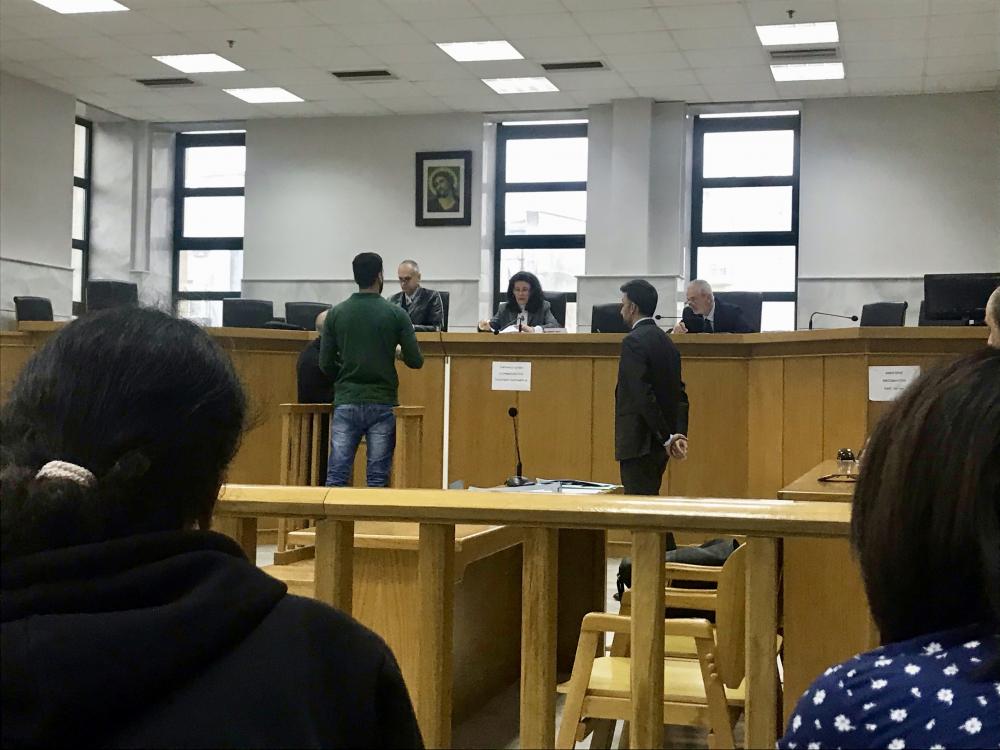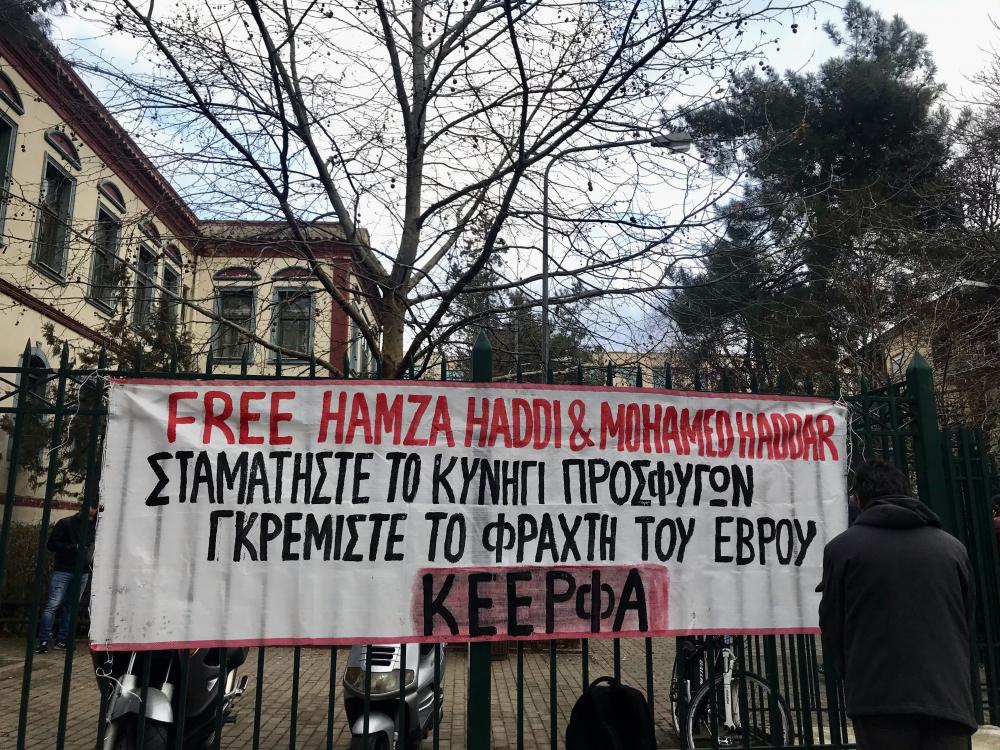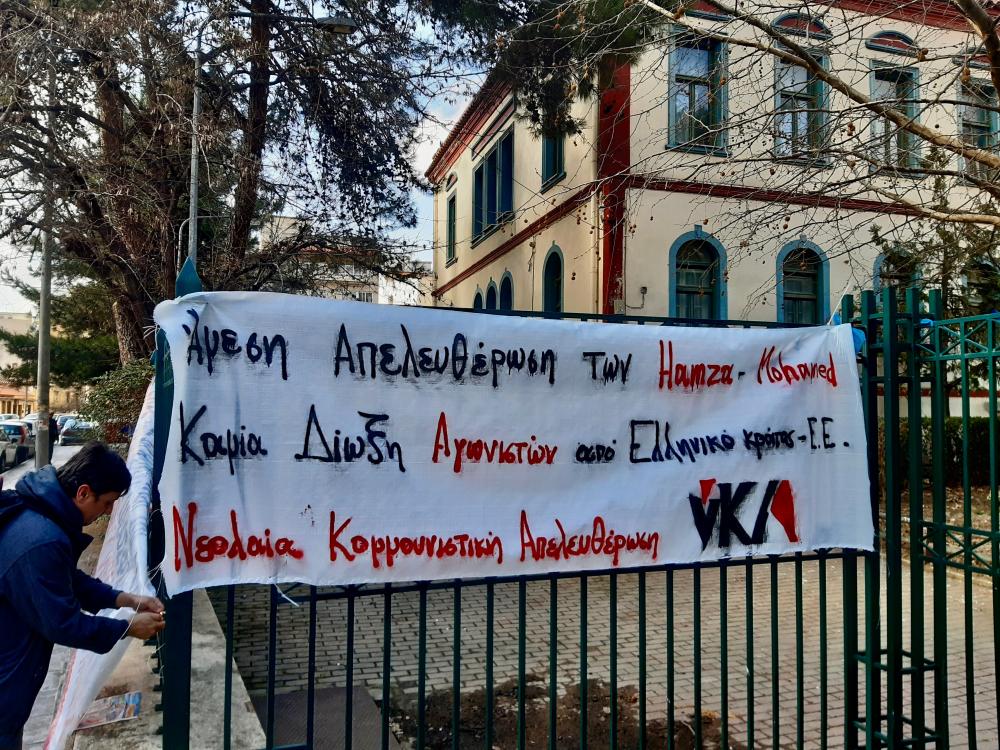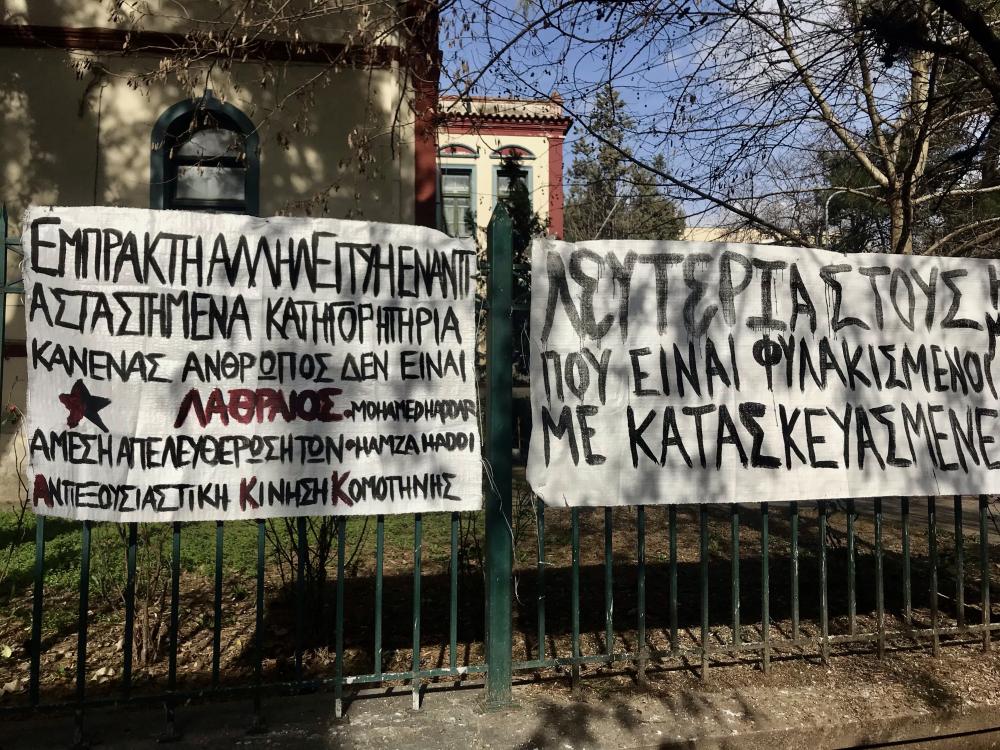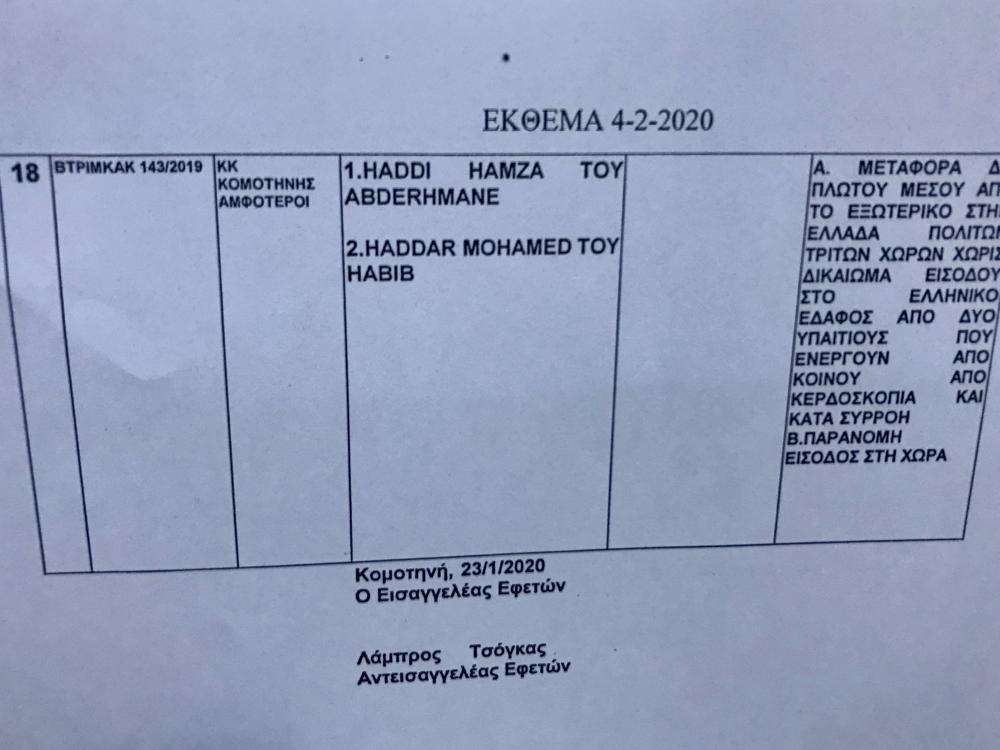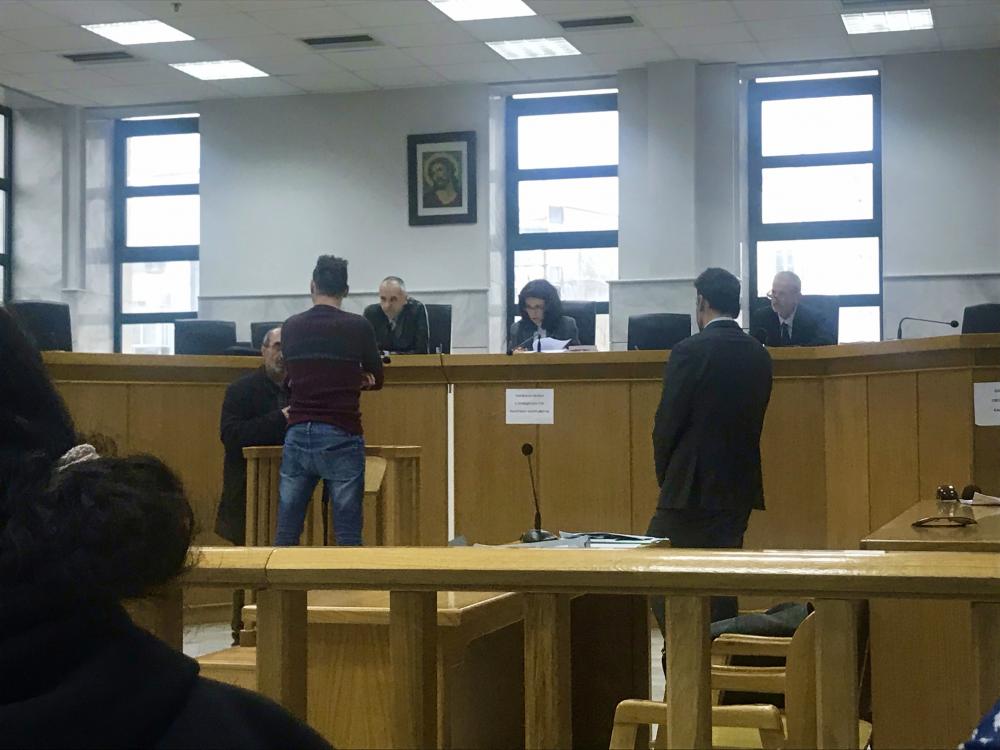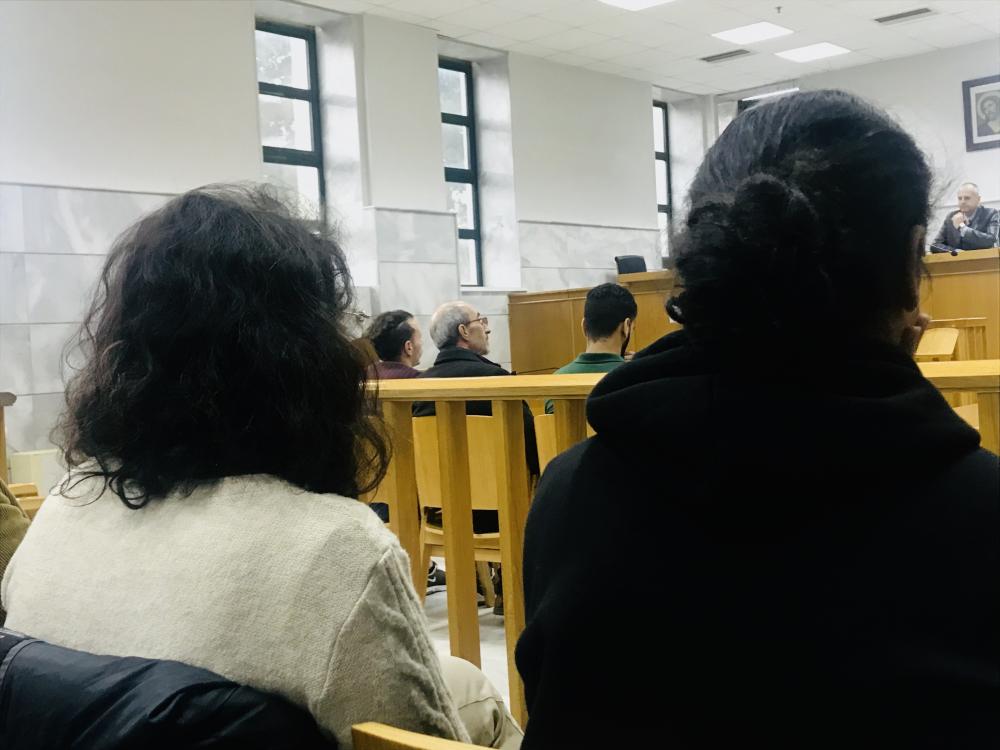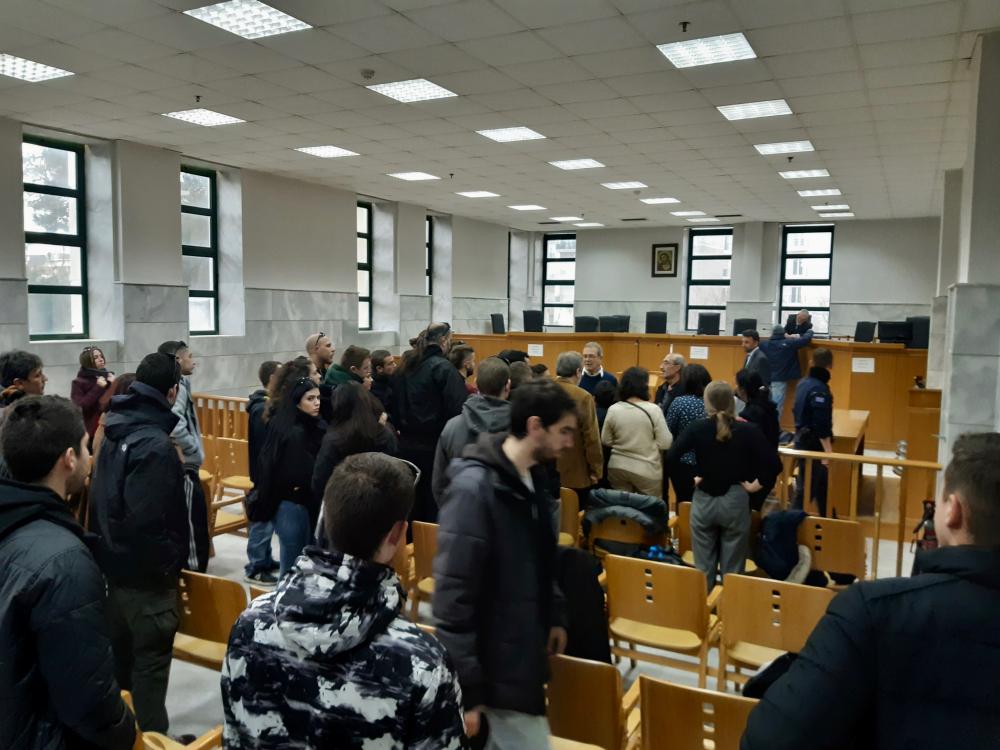Report: Trial against Hamza Haddi & Mohamed Haddar
04.02.20 in Komotini, Northern Greece
Achim Rollhäuser (AED-EDL*), Julia Winkler (borderline-europe)
Download the report: German | English | French
Hamza Haddi and Mohamed Haddar were accused after their own escape of illegally transporting two other Moroccans, including the brother of Hamza, Yassine Haddi, to Greece. They were also prosecuted for their own illegal entry. In addition, they were accused of acting for profit. The case of Hamza and Mohamed is not an isolated incident, but paradigmatic for another facet of European policy of closing borders and deterrence, where refugees and migrants are criminalised by the arbitrary application of anti-smuggling laws.
According to the defendants and the two other Moroccans who entered the country and were questioned as witnesses, the facts of the case are as follows: Hamza and Yassine travelled to Istanbul in order to travel on to Europe in order to escape persecution by the Moroccan authorities for their political activities. Relatives of theirs had already been granted political asylum in other European countries.
In Istanbul they met two other Moroccans and decided to cross the border with Greece, which is marked in the European part of Turkey by the river Evros, together with them. They found a smuggler who took them to a small island in the river (of which there are many, especially in summer, when there is not much water in the river) and left them to their own devices. The four of them stayed overnight on the island and the next day they found a makeshift boat which they set off towards the Greek shore. All four took turns rowing; just before they reached the Greek shore, Hamza and Mohamed held the paddles.
§ Section 30 of the Migration Act as amended in 2014 reads
1. The captains or commanders of ships, floating means of transport or aircraft as well as drivers of all types of transport which bring into Greece from abroad third-country nationals who are not allowed to enter Greek territory or who have been refused entry for any reason, and those who receive them [the third-country nationals] at the points of entry, external or internal borders with a view to transporting them to the interior or to the territory of an EU Member State or a third country, or who facilitate their transport or provide them with accommodation in hiding, shall be punished as follows:
a. with a custodial sentence of up to ten (10) years and a fine of ten thousand (10,000) to thirty thousand (30,000) euros for each person transported
b. with a custodial sentence of at least ten (10) years and a fine of thirty thousand (30,000) to sixty thousand (60,000) euros for each person transported, if the offender is a profit-seeking or commercial or habitual offender or has relapsed or is employed in the public sector or is an employee or of a tourism, shipping or travel agency or if two or more act together,
c. with a prison sentence of at least fifteen (15) years and a fine of at least two hundred thousand (200,000) Euros for each person transported, if the act may lead to danger for people,
d. with life imprisonment and a fine of at least 700,000 euros for each person transported, if death occurs in the case of letter c.
2.-5. ...
6. The above sanctions shall not apply to the rescue of persons at sea or to the transport of persons in need of international protection in accordance with the provisions of international law.
type="text/css"
Hamza and Mohamed were accused of both acting for profit – although nowhere in the file it is said that they received anything in return for rowing - and that they were acting together. (If only one had rowed, this point would have been omitted.) With these qualifications, the act is considered a crime. Thus, they were facing a minimum penalty of 10 years for each of their two "fellow travellers" = a total of at least 20 years and also a total fine of 60.000-120.000 €.
The trial
The trial took place on 04.02.20 in Komotini, Greece. It had already been adjourned once in December because the only witness for the prosecution, the arresting police officer, was ill.
The bench was occupied by a single judge. This is an innovation of the last reform of criminal procedure of July 2019. Up to now, a three-member panel of judges always had to decide in trial regarding crimes. In accordance with the usual arrangement, the prosecutor sat next to the judge on the right (seen from the elevated bench) and the clerk sat on the left. The accused sit down on chairs, facing the court (back to the audience), the lawyers sit on benches or chairs on the right and left side, usually at the same height as the accused and the audience. The audience, where the witnesses must also first sit down, is separated from the court, the lawyers and the accused by a wooden barrier of about 1 m height.
The trial was the last of the hearings scheduled for that day with No. 18 on the notice board. Since only a few hearings took place - most of them were adjourned or postponed for other reasons - the trial began at around 11.30 a.m. Once again the police officer did not appear, allegedly ill again. The question arose whether the defense, for its part, should now request an adjournment, since the defense counsel would have liked to question the officer on his statement. The defense counsel discussed the matter with Hamza's family - Yassine was there, a sister had come from Italy and two close friends from Morocco. It was decided that despite the absence of the border police officer, the trial should be held in order not to prolong the trial any further. Furthermore, the presence of the many witnesses and supporters who had come especially for the trial outweighed the interrogation of the officer and should be made use of.
The courtroom was not yet completely filled with listeners at the beginning of the hearing. However, since both leftist and anarchist groups had called for attending the trial in Komotini, it filled up more and more in the course of the trial, until finally about 40 people were present and it was full. (There were also a certain number of law students from the University of Komotini, one of the largest law faculties in Greece)
First of all, the presence of the accused - who had been brought from the detention centre - and of the witnesses named by the defence was established. The defence had listed the brother, the sister, a close acquaintance of Hamza and Joachim Rollhäuser; Joachim R. as representative of the Association of European Democratic Lawyers and as a witness for the fact that the trial is being followed with great attention also from abroad. Julia Winkler (borderline-europe) and Sascha Girke (iuventa10) were also named, but the judge immediately made it clear that she would not hear all the witnesses and that the defense should limit the number to four. (It should be noted that this is not an unusual procedure in Greece). The relatives were allowed to stay in the hall; Joachim R. had to leave the hall.
Then the written statement of the arresting police officer was read out. Afterwards first the relatives and then Joachim R. were heard as witnesses. An interpreter for the Arabic language was present for the relatives and the defendants themselves. The lawyer had already handed over the declaration of solidarity initiated by borderline-europe with the 46 signatures as well as the declaration of the AED-EDL (European Democratic Lawyers), which Joachim R. had brought with him.
The defendants were then heard. Unfortunately, it turned out that both the judge and the interpreter spoke so quietly that practically nothing could be understood in the audience.
This only changed when the defense counsel made his plea. First of all, he emphasized the absurdity of the charge in so far as no profit had been established anywhere, secondly, that the boat on the river with its current needed to be rowed by more than a single person, thirdly, it had been completely coincidental who had had the paddles in their hands, and finally, the four of them were or are political refugees; see para. 6 of § 30 MigrG. The only correct decision therefore would be an acquittal.
Although the public prosecutor did not follow this plea, he dropped the aggravating charges of the pursuit of profit and joint action and requested that the two defendants be sentenced. The judge sentenced as requested.
Then there was the question of the level of penalties. According to Greek law, sentencing happens in two stages. First, a decision is made for which acts a sentence is passed or an acquittal is pronounced, then, in the second step, the amount of the penalty is determined separately and after a further hearing of the defence counsel. The prosecutor requested a penalty of 4 years and 1 month for each of the two accused (3 + 3 years for each person transported, constringed to 4 years, 2 months for their own illegal entry, all constringed to 4 years and 1 month imprisonment), taking into account the mitigating circumstance of no previous convictions. The judge also followed him in this. According to the law, an additional fine should have been imposed as well. But neither we as listeners nor the lawyer noticed anything of this. Also in the final judgement there is nothing about it.
In Greek law, conditional release can be granted after 2/5 of the sentence served (in Germany after 2/3). 2/5 of 48 months is 19.6 months. The accused have served almost 7 months of the sentence by being held in pre-trial detention. So they still have about 12 ½ months of imprisonment ahead of them.
In terms of the total time they will have to serve, it will depend on whether they can work in Komotini prison. (At least Hamza has already worked for three months.) Working reduces the prison time. By how much depends on the severity of the work. The lawyer explained that in Komotini prison there is only work for which the minimum amount of credit is given, i.e. 1 working day is counted as 1.5 days in prison. That means that 8 months of prison work can be used to serve 12 months of criminal sentence. So if this works out, they could be released after 8 months. But that seems unlikely since in Komotini prison there is not enough work for all prisoners and therefore they can only work alternately.
The lawyer will appeal. It may be, but is not at all certain that the appeal hearing will take place before the rest of the sentence has been served. If the court of appeal should then reduce the sentence - which is usually the case in Greece - a discharge could also take place before then. Everything is open here.
The defense counsel stated that he would continue to plead for acquittal on appeal. This is also important in view of the fact that, as a rule, asylum is not granted in the case of a conviction for a crime. Although there would be no deportation, particularly with regard to Hamza, his status would of course be different and more uncertain than if he is being granted political asylum.
Overall, the outcome of the process can be seen as a relative "success". Of course, it is not a victory; a victory would have been an acquittal. According to the lawyer, however, this was the "second-best" result after an acquittal, which actually seemed almost impossible from the outset. Compared to other verdicts in such trials, the verdict is low.
Impact of the campaign
type="text/css"
According to the assessment of everyone involved, the mobilisation around the trial has played a decisive role. Public pressure could be considerably increased in the form of the declaration of solidarity, the mandate and testimony of Joachim R. as a lawyer of the AED-EDL and the presence of numerous listeners. Experience shows that such things are important in Greece, probably more important than in Germany. Attention is being paid to who and how people abroad perceive such trials.
Ultimately, however, it should be noted that the experience gained in the case of Hamza & Mohamed case cannot be easily adapted for other cases. The vast majority of people who are arrested and sentenced lack all the aforementioned characteristics and support. It will not be possible to organise this for each and every one of them. It should also be noted that Hamza Haddi is also a well-known political activist (one can find on google). He is embedded in a political structure. Otherwise we probably would never have heard of him.
The problem cannot be fought (only) on an individual level on a case-by-case basis, but must be fought on a political level.
* European Democratic Lawyers: http://www.aeud.org/
More Information:
- Joint solidarity statement: "Free Hamza Haddi & Mohamed Haddar"
- Hamza and Mohamed support committee
- Deportation Monitoring Aegaen: "The war against smuggling - Incarcerating the marginalized"
The case of Hamza and Mohamed is unfortunately not an isolated case but paradigmatic for yet another facet of Europe's policy of closing borders and deterrence. While European supporters or so-called "human rights defenders" such as Carola Rackete or the iuventa10 have recently received a lot of attention and support after having become the target of increasing criminalisation, there is hardly any information nor support for those without a European passport facing the very same accusations. However, it is them who constitute the majority of those being arrested and imprisoned in Italy and Greece on grounds of alleged "smuggling" and "aiding illegal immigration". Arrested immediately upon arrival, a lot of them disappear unknown and unheard of and with no access to support from outside.
The basis for this is Greek legislation that considers any person found to have driven a vehicle across Greek borders, entering Greece without required documentation, as a smuggler.
The arrests as well as trials that follow these often-unfounded accusations of smuggling are arbitrary. Police officers might accuse the person holding the tiller to steer the boat, or the one who communicated with the coast guard to call for help or simply someone who speaks English, to be a smuggler. In Greece, the average trial lasts only around 30 minutes, leading to an average sentence of 44 years and fines over 370.000 Euro. Suspects, or what we would deem ‘victims’ of this unjust legislation, usually have limited access to legal assistance, most of them relying on public defenders. Observers voice concerns about a “shocking lack of deep processing”, reporting that judgements are pronounced despite lack of evidence and poor quality of translation.
type="text/css"
type="text/css"

